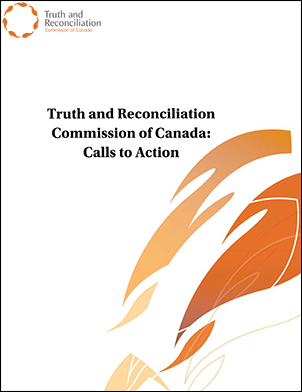Journey of Reconciliation

Background
The City of Winnipeg has supported Indigenous specific projects and initiatives since 2000. The Indigenous Relations Division (IRD) was created in 2013 to coordinate Indigenous specific programs and initiatives. IRD has been tasked with leading the design and implementation of the five Truth and Reconciliation Calls to Action relating to municipalities, the development of the Urban Accord, and other initiatives related to the Year of Reconciliation.
In January 2016, Mayor Brian Bowman declared 2016 as the Year of Reconciliation which included various announcements to demonstrate the City of Winnipeg’s commitment to reconciliation. Announcements included initiatives such as but not limited to:
- The creation of the Winnipeg Indigenous Accord
- The implementation of 5 Truth and Reconciliation Commission of Canada (TRC) Calls to Action that relate to the Municipal Government directly
- The commemoration of the Assiniboia Residential School
The 2016 declaration for the Year of Reconciliation is just the first step for the City of Winnipeg’s Journey to Reconciliation.
Since then, the Winnipeg Public Service has discussed options and actions going forward; met with external stakeholders such as the National Centre for Truth and Reconciliation (NCTR); discussed partnership opportunities to collaborate on the Calls to Action; developed communication plans; implemented various strategies to address the TRC’s Calls to Action and drafted potential outcomes for the work to be undertaken.
TRC Calls to Action
What is the Truth and Reconciliation of Canada
The Truth and Reconciliation Commission of Canada (TRC) is a component of the Indian Residential Schools Settlement Agreement. Its mandate is to inform all Canadians about what happened in Indian Residential Schools (IRS). The Commission documented the truth of survivors, families, communities and anyone personally affected by the Indian Residential School experience. This includes First Nations, Inuit and Métis former Indian Residential School students, their families, communities, the Churches, former school employees, Government and other Canadians. View those reports here.
 |
In June 2015, the Big City Mayors’ Caucus of the Federation of Canadian Municipalities recognized the significant work of the TRC. The Federation called upon municipalities to work toward implementation of five of the TRC’s Calls to Action relating to municipalities.
The City led a working group to review the recommendations in the context of activities already underway to support the implementation of the recommendations, as well as identify potential new activities to undertake as a city to accomplish the intent of the recommendations. For more information, please consult the report.
TRC Calls to Action Relating to Municipalities
The following are descriptions of the five TRC Calls to Action relating to municipalities as well as a summary of the work the City has undertaken for each Call to Action.
TRC #43 - UNDRIP
“We call upon federal, provincial, territorial, and municipal governments to fully adopt and implement the United Nations Declaration on the Rights of Indigenous Peoples (UNDRIP) as the framework for reconciliation.”
TRC #47 - Doctrine
"We call upon federal, provincial, territorial, and municipal governments to repudiate concepts used to justify European sovereignty over Indigenous peoples and lands, such as the Doctrine of Discovery and terra nullius, and to reform those laws, government policies, and litigation strategies that continue to rely on such concepts."
TRC #57 - Training
"We call upon federal, provincial, territorial, and municipal governments to provide education to public servants on the history of Aboriginal peoples, including the history and legacy of residential schools, the United Nations Declaration on the Rights of Indigenous Peoples, Treaties and Aboriginal rights, Indigenous law, and Aboriginal-Crown relations. This will require skills based training in intercultural competency, conflict resolution, human rights, and anti-racism."
TRC #75 - Cemeteries
"We call upon the federal government to work with provincial, territorial, and municipal governments, churches, Aboriginal communities, former residential school students, and current landowners to develop and implement strategies and procedures for the ongoing identification, documentation, maintenance, Commemoration, and protection of residential school cemeteries or other sites at which residential school children were buried. This is to include the provision of appropriate memorial ceremonies and commemorative markers to honor the deceased children."
We will also begin looking into how our work for this call to action, impacts the following related Calls to Action:
#73 Missing Children and Burial Information - "We call upon the federal government to work with churches, Aboriginal communities, and former residential school students to establish and maintain an online registry of residential school cemeteries, including, where possible, plot maps showing the location of deceased residential school children."
#74 Missing Children and Burial Information - "We call upon the federal government to work with the churches and Aboriginal community leaders to inform the families of children who died at residential schools of the child's burial location, and to respond to families' wishes for appropriate commemoration ceremonies and markers, and reburial in home communities where requested."
#76 Missing Children and Burial Information - "We call upon the parties engaged in the work of documenting, maintaining, commemorating, and protecting residential school cemeteries to adopt strategies in accordance with the following principles":
- The Aboriginal community most affected shall lead the development of such strategies.
- Information shall be sought from residential school Survivors and other Knowledge Keepers in the development of such strategies.
- Aboriginal protocols shall be respected before any potentially invasive technical inspection and investigation of a cemetery site.
TRC #77 - Archives
"We call upon provincial, territorial, municipal, and community archives to work collaboratively with the National Centre for Truth and Reconciliation identify and collect copies of all records relevant to the history and legacy of the residential school system, and to provide these to the National Centre for Truth and Reconciliation."
